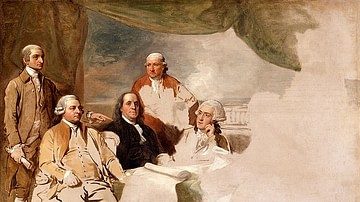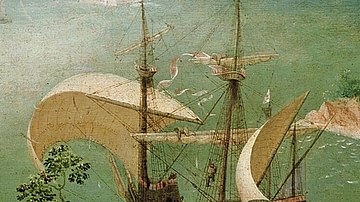Search
Did you mean: Brahma?
Search Results

Image
Luke Roberts as Woodes Rogers
Luke Roberts as Woodes Rogers in the TV series Black Sails. Rogers (l. 1679-1732) was a former privateer and navigator who served twice as the governor of the Bahamas. He was charged with stamping out piracy in the area and particularly the...

Image
Map of Spanish Main & West Indies c.1720 - Spain, France, England, and the Dutch in a Struggle Over Trade, Treasure, and Empire
This map captures the shifting tides of colonial power in the 1700s, focusing on the strategic coastlines of the Caribbean Sea and the Gulf of Mexico. Once dominated by Spain, this region—known as the Spanish Main and the West Indies—became...

Definition
Columbian Exchange
The Columbian exchange is a term coined by Alfred Crosby Jr. in 1972 that is traditionally defined as the transfer of plants, animals, and diseases between the Old World of Europe and Africa and the New World of the Americas. The exchange...

Definition
European Colonization of the Americas
The European colonization of the Americas was the process by which European settlers populated the regions of North, Central, South America, and the islands of the Caribbean. It is also recognized as the direct cause for the cultures of the...

Definition
Transatlantic Slave Trade - The Shame of Nations
The transatlantic slave trade (also given as the Atlantic slave trade, circa 1492 to 1860) was the practice of enslaving the citizens of African states and transporting them across the Atlantic Ocean to the "New World" of the Americas. Although...

Definition
Spanish Main
The Spanish Main refers, in its widest sense, to the Spanish Empire in the Americas from Florida in the north to the northern coast of Brazil in the south, including the Caribbean. The term was initially more limited and referred only to...

Definition
Blackbeard
Blackbeard (d. 1718), otherwise known as Edward Teach (probably an assumed name), was an infamous English pirate who operated in the Caribbean and Atlantic during a surprisingly short career lasting just 15 months. With his long black beard...

Definition
Frederick Douglass - American Visionary
Frederick Douglass (circa 1818-1895) was an abolitionist orator, minister, writer, editor, reformer, and statesman, who had been born a slave in Maryland, escaped to New York at around the age of 20, and became a talented orator and writer...

Definition
Treaty of Paris of 1783
The Treaty of Paris, signed on 3 September 1783 by representatives from Great Britain and the United States, was the peace agreement that formally ended the American Revolutionary War (1775-1783) and recognized the United States as an independent...

Definition
Carrack
The carrack (nao in Spanish, nau in Portuguese, and nef in French) was a type of large sailing vessel used for exploration, to carry cargo, and as a warship in the 15th and 16th centuries. Famous carracks include the Santa Maria of Christopher...